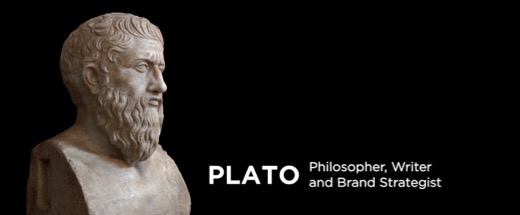
The ancient philosopher Plato made significant contributions to humankind. His philosophical fingerprints can still be felt today in how we think about mathematics, science/nature, morals, politics and the arts.
Perhaps it’s time we add “brand strategy” to the long list of contributions Plato has made to civilization.
To explain “how great companies have great purposes,” the authors of CONSCIOUS CAPITALISM draw connections between Plato’s take on transcendental philosophy and modern-day brand strategy.
In its most simplistic form, transcendental philosophy provides a framework for understanding how we, as humankind, can live a worthwhile life.
Plato outlined three transcendental ideals to follow in order for people to make a meaningful contribution. These same ideals can be viewed from the perspective of a how a business can live the brand in a purposeful way to become profitable.
These transcendental brand strategy ideals, as outlined in CONSCIOUS CAPITALISM, are: The Good, The Truth and The Beautiful.
brand ideal # 1 | The Good
Plato believed the power of The Good happens when people are in service to others by expressing love, compassion, and empathy. Flipped to the view of business and branding, The Good is all about helping people live a better life.
The brand purpose of improving a person’s life through products and services is an everlasting ideal.
Starbucks is an example of a business that follows The Good ideal. Starbucks success is built upon its desire to inspire and nurture the human spirit through the connectedness that comes with enjoying a simple cup of coffee.
The Sleep Number brand also taps into the power of The Good by improving people’s lives through a better night’s sleep. (More importantly, there is no telling how many marriages the Sleep Number bed has saved.)
The authors specifically mention The Container Store as an enduring brand that follows The Good strategy to success because the company helps people become happier by being more organized.
brand ideal #2 | The Truth
The unrelenting pursuit of understanding and fighting for justice and truth is a noble way to for a person to live. It’s also a noble pursuit for a brand to follow to find long-lasting success.
Brands living for The Truth focus their efforts on correcting marketplace injustices.
Southwest Airlines was founded upon the principle of righting the wrongs in airline travel from making it less expensive to fly to making the in-flight experience more humane and to eliminating add-on fees.
Whole Foods Market has found long-lasting success by bringing The Truth in the form of only selling foods that are free from artificial ingredients, growth hormones, and anything else that’s fake.
brand ideal #3 | The Beauty
Lives are enriched when people pursue greatness to change the world for the better. Beauty is the by-product of such a pursuit.
When brands follow The Beauty strategy path, they embark on a never-ending journey of continuous improvement to achieve excellence. A simple way for a business to follow this pathway is to take something people perceive as good and make it better.
The authors highlight Apple as a quintessential Beauty brand because the company is focused on making “insanely great” products. Apple succeeds by taking what is already good and making it better. It made the PC computer better through its Macintosh (Mac) product platform. It made the mp3 player with its iPod lineup. Tablets existed before the iPad but the iPad greatly improved the tablet.
It’s amazing to think how brilliantly the ancient transcendental philosophy from Plato works to help focus a business on its higher purpose.
By focusing supremely on its true purpose, businesses can connect more emotionally (and rationally) with consumers, leading to being a profitable and quite possibly… a transcendent brand.